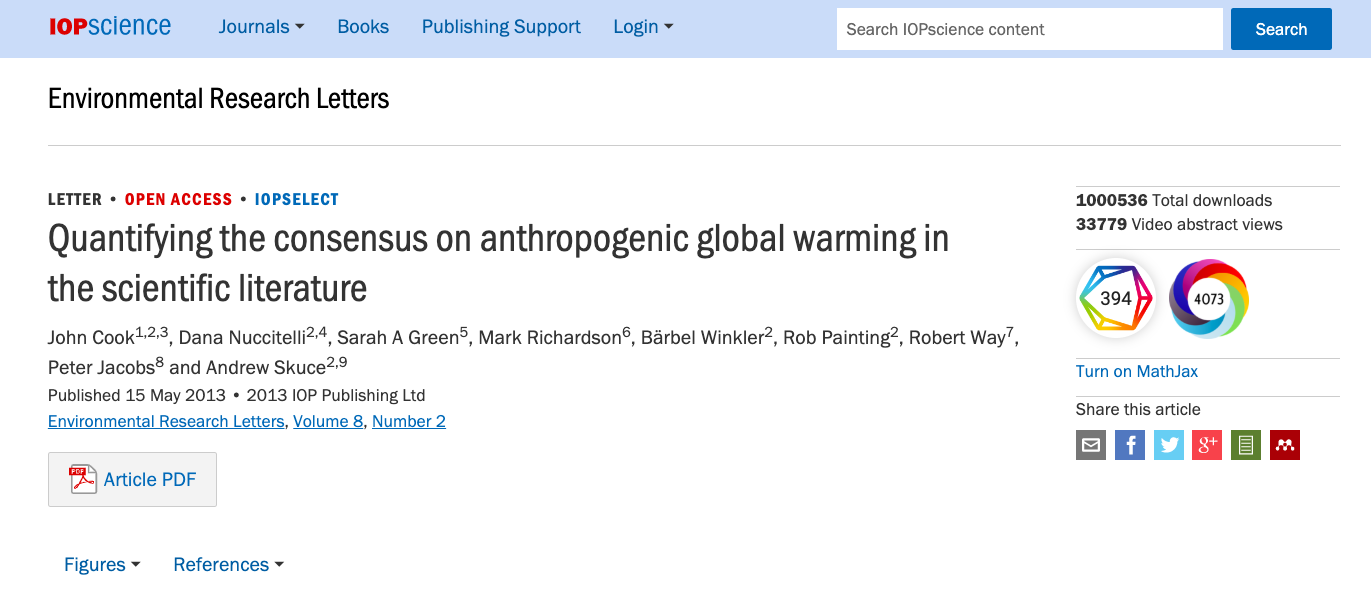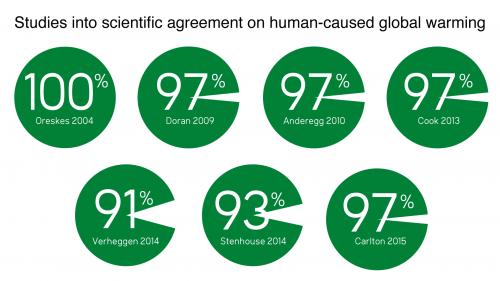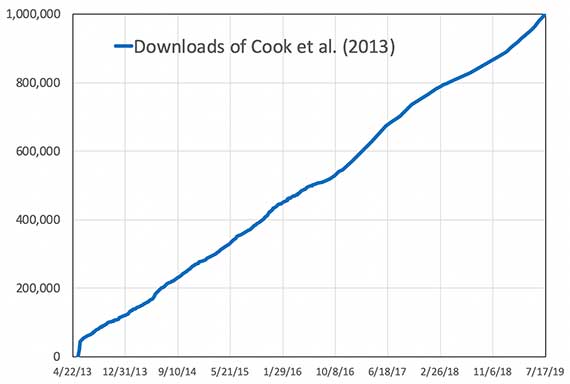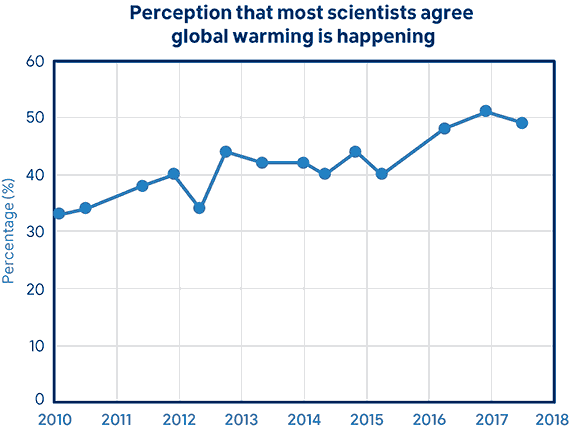
Our 2013 study Quantifying the consensus on anthropogenic global warming in the scientific literature just hit one million downloads! This makes it the #1 most downloaded paper at the journal Environmental Research Letters. In fact, it's the most downloaded paper in the 80+ journals published by the Institute of Physics. One million+ downloads are usually reserved for viral videos involving piano-playing cats. Not a bad effort for a peer-reviewed scientific paper!

In just six years, our paper has seen a lot of action. The study began as a citizen-science effort, following up on Naomi Oreskes' 2004 consensus study (which coincidentally is on the cusp of one million downloads). We ambitiously decided to replicate her content analysis but with 12,000+ studies. The effort took over a year, categorizing every abstract at least twice. Once we finished our own categorization, we then invited the authors of the studies to categorize their own research. Both methods obtained the same result: 97% agreement that humans were causing global warming among papers stating a position on the topic.
Our study was published in May 2013, thanks to generous donations from Skeptical Science readers. The next day, President Obama tweeted our key result of 97% consensus. The paper received a great deal of media attention as well as from key public figures such as Elon Musk, Al Gore, and John Oliver. In front of almost every world leader, Prime Minister David Cameron referenced the 97% consensus and our study at the COP21 Paris meeting.
However, to paraphrase Uncle Ben: with great impact comes great pushback. Our paper immediately began receiving attacks from climate science deniers. It started with blog posts, then conservative politicians such as Ted Cruz and Rick Santorum began criticizing it, then the attacks spread to Fox News and conservative media. Probably our favourite criticism came from Senator Ted Cruz who claimed the 97% consensus was based on one discredited study. Whenever I discuss this criticism with Peter Doran (who found 97% consensus in 2009) or William Anderegg (who found 97% consensus in 2010), we speculate on which of our studies was the "one discredited study" that Cruz was referring to.
The fact that the 97% consensus has been replicated in multiple studies is a key feature of the scientific consensus. A comment by Richard Tol claimed that our 97% consensus result was an outlier compared to the other consensus studies. To argue this, Tol distorted and misrepresented the results from the other studies, leading to unequivocal denouncements from the authors of those studies.
Tol's egregiously flawed piece also led to the authors of seven leading consensus studies to publish Consensus on consensus: a synthesis of consensus estimates on human-caused global warming. In this study, we summarized the studies attempting to quantify the scientific consensus on human-caused global warming. We found that among climate experts, consensus estimates varied between 90 to 100%, with multiple studies converging on 97% agreement.

We also highlighted a common pattern found in numerous studies—as expertise in climate science increases, so too does agreement with human-caused global warming. The problem is that this relationship between expertise and consensus is often exploited by climate misinformers who cherry-pick groups with less expertise in climate science to obtain lower estimates of consensus. This technique of "fake experts" was employed by Tol in his comment.
While our study has been incessantly attacked since 2013, we make lemonade from lemons every step of the way. We used attacks on our study to draw attention to the 97% consensus and explain the denialist techniques employed to confuse the public. As a consequence, our paper's downloads has been steady for the last half-decade, with no sign of slowing down...

As the incessant attacks on our study have helped draw attention to the 97% consensus, it comes as no surprise that over time, public surveys have found that awareness of the scientific consensus is increasing.

The good news is public understanding of the scientific consensus is increasing. The bad news is there is still a lot of work to do yet as climate deniers continue to persistently attack the scientific consensus. Most recently, the Competitive Enterprise Institute are attempting to widen the consensus gap by pressuring NASA to remove information about the consensus from their website. So we will continue to communicate the 97% consensus and counter misinformation, using the best practices spelled out in the Consensus Handbook.
And we're also keeping a close look at our Consensus on Consensus study—wondering when it will hit a half million downloads...
Posted by John Cook on Wednesday, 17 July, 2019
 |
The Skeptical Science website by Skeptical Science is licensed under a Creative Commons Attribution 3.0 Unported License. |